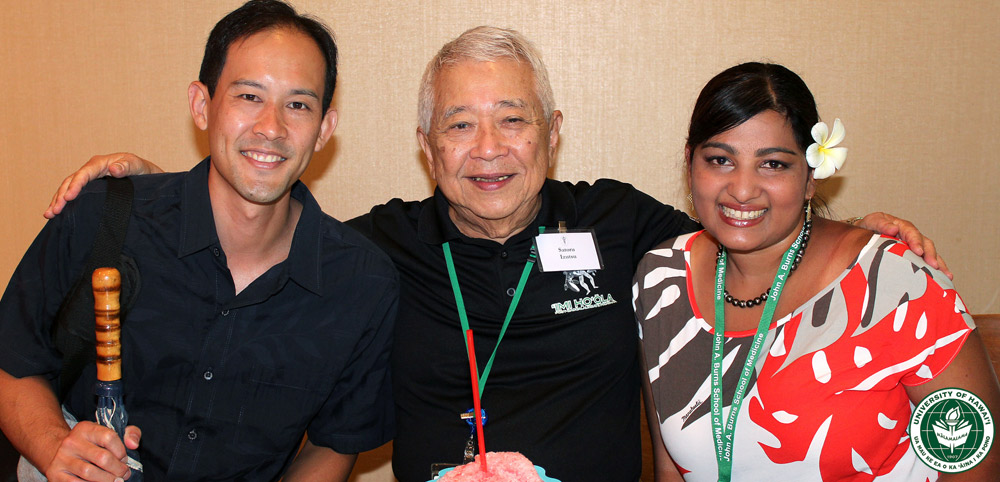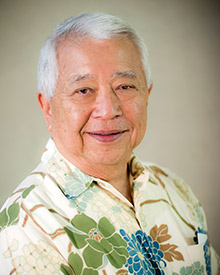
UH Mānoa alumnus Dr. Satoru Izutsu
 Photo caption: Dr. Bryce Higa (JABSOM 2006), Dr. Satoru Izutsu, Dr. Adenine Stanislaus (Higa) (JABSOM 2006).
Photo caption: Dr. Bryce Higa (JABSOM 2006), Dr. Satoru Izutsu, Dr. Adenine Stanislaus (Higa) (JABSOM 2006).
Dr. Satoru Izutsu is going to be 89 in September 2017. As vice dean of the John A. Burns School of Medicine, he is preparing to call it a career. He remembers a piece of advice his father once told him, while he was still a boy on a Kaua‘i plantation: “You don’t have to save money, but travel—because travel is education.”
Before he was even out of high school, he traveled for his education. First as a high-school dorm resident at Mid-Pacific Institute, then as an undergraduate at UH Mānoa. Studies at Columbia University in New York City, and at Case Western Reserve University in Cleveland followed. As a UH Army ROTC commissioned infantry officer, he was called to active duty during the Korean War and remained in the active Army Reserve for 30 years. His last assignment in the military was as Mobilization Designee to the Chief of the Army Medical Specialist Corps in the Office of the Surgeon General at the Pentagon. Dr. Izutsu retired as a full colonel. His expertise and leadership took him to eastern Europe and remote parts of Micronesia, Thailand and South Asia. Yet no matter where his profession or education led him, Hawai‘i was always home.
When Hawai‘i became the fiftieth state during his doctoral studies at Case Western Reserve, the new state of Hawai‘i government reached out to its people living abroad, encouraging them to fill civil service positions back home. An eight-month detour with the American Friends Service Committee came first, with Dr. Izutsu volunteering to start the first class of occupational therapists in Yugoslavia. He then returned to O‘ahu to direct a training program at Waimano Training School and Hospital. Two years later, he was the superintendent of the 860-bed facility for people with severe mental and physical disabilities.
“We didn’t have many special programs for children with these conditions,” he comments, “but in 1962, President John F. Kennedy, who had a sister with special needs, changed the picture of special education and care for the mentally retarded in the United States. It became a mission for pioneers in Hawai‘i such as Dr. Angie Connor to transition residents out of large institutions and into foster care and small group living. All the people involved did a wonderful job to make the lives of retarded children in Hawai‘i more humane.”
The next chapter in Dr. Izutsu’s journey was with the Regional Medical Program at UH Mānoa. “Our mission was to further acknowledge and address issues related to cancer control, stroke detection, and heart disease treatments. We covered Hawai‘i as well as Micronesia, Guam and the South Pacific.” Next came a professorship in the School of Public Health at Mānoa, which led eventually to the position of Associate Dean and directing admissions at JABSOM. Dr. Izutsu is licensed in Hawai‘i as an occupational therapist, psychologist, and nursing home administrator.
For nearly 21 years, Dr. Izutsu interviewed every medical school applicant—over one thousand in all—and gave each a minimum of 40 minutes so he could assess their likelihood of success in medicine. “I looked for leadership and interpersonal skills, a genuine compassion to help people and the capacity to assess one’s own physical and mental health,” he says. Dr. Izutsu believes society depends on doctors to lead them in many ways.
As Dr. Izutsu wraps up a distinguished career, he shares his thoughts of a long and healthy life combined with a rewarding profession: “I believe that people, in general, are basically good. And don’t stress out! If you encounter stress, know that it’s temporary. Avoid stressful people! When you see them coming down the hall, duck! Stress can confuse you, but worrying doesn’t help. Why are you letting something inevitable stress you out? Roll with it. Go with the flow.”
